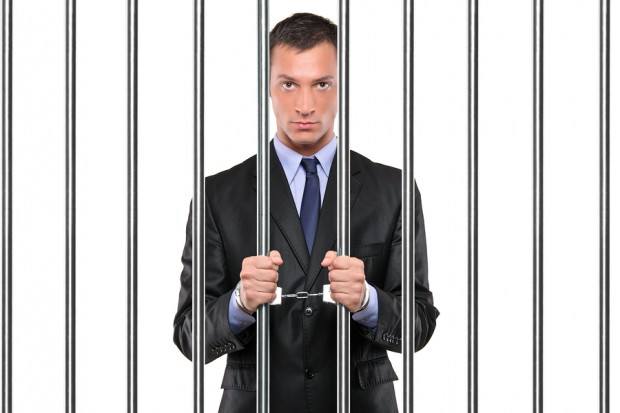Crooked bankers and insider traders would have no safe havens under planned global guidelines for market-abuse penalties, amid concerns some countries don’t have strict enough rules.
Culprits should face prison or tough fines regardless of where they are based, said David Wright, secretary general of the International Organization of Securities Commissions, a group of global regulators working on principles for how to deter investment banks, other financial firms and staff from abusing markets.
“We have simply had far too many examples over the last 10 years of totally unacceptable behavior in financial markets,” Wright said in an interview. “The potential illicit financial gains for them far outweighed the risks and costs of getting caught. This equation must be reversed.”
Faith in the financial industry has been rocked by probes into suspected rigging of benchmarks including Libor and rates underpinning markets from oil to currencies. Banks in the U.K. are embroiled in scandals over improper sales of insurance products and derivatives. The European Union estimated that manipulation and insider dealing amounted to 13.3 billion euros ($17.9 billion) in the bloc’s equities markets alone in 2010.
“In my personal view,” those “who blatantly break the rules and mis-sell and try to profit unfairly, there’s only one place they should go and that’s the nearest penitentiary,” said Wright.
‘World Champion’
Penalties for market-abuse cases vary widely from country to country, Pierre-Henri Conac, a professor at the University of Luxembourg, said in an interview.
The “uncontested world champion” for enforcement is the U.S., Conac said. While the U.S. has a clear willingness to send people to jail, “this is different in other countries, like in France, where since 1970 only 2 people went to jail for market abuse”
Some regulators, including the U.K. Financial Conduct Authority, already have the power to levy fines of as much as 20 percent of an institution’s annual revenue, depending on the seriousness of the breach. That’s double the 10 percent fines European antitrust regulators can impose.
“Australia, Europe, because of the market-abuse regulation, the Swiss, U.S. and Canada, will certainly be compliant” with what Madrid-based Iosco proposes. “Others you have to take on a case-by-case basis,” Conac said.
Common Standards
Wright said Iosco, which brings together regulators from more than 100 nations to coordinate and set common standards, will seek to close off the possibility for market abusers to locate themselves in countries that lack effective penalties. He didn’t cite specific nations that have lax enforcement systems.
Iosco is seeking to avoid a situation where “those who want corrupt global financial markets will go to those jurisdictions with low sanctions,” he said. “We don’t want that. We want tough and sufficient sanctions everywhere. It’s about closing loopholes.”
The group is assessing national sanctions practices as a prelude to decisions on further steps, Wright said.
“In one respect it’s the age-old problem of race to the bottom, race to the top,” Cornelius Hurley, director of the Center for Finance, Law and Policy at Boston University, said in a phone interview. “Do you try to be the best, with the risk that institutions try to move elsewhere, or do you try to be competitive through laxity?”
Race to Top
“There does seem to be an emerging trend here that global regulators and supervisors are in a race to the bottom in their rulemaking while the enforcers, including some of the regulators, are in a race to the top.”
EU lawmakers approved tougher market-abuse rules this month that seek to plug enforcement gaps in the 28-nation bloc. The measures boost minimum sanctioning powers available to authorities following warnings from EU regulators that some nations lacked sufficient deterrents.
As many as nine EU nations had maximum fines for market manipulation of 200,000 euros or less, while eight didn’t have sufficiently broad powers to impose jail sentences and other criminal sanctions, according to an EU study from 2011.
Million Dollars
“It’s not about the fines being too low, just about them being uncoordinated,” Simon Gleeson, a financial regulation lawyer at Clifford Chance LLP, said in a phone interview. “For one regulator, a million dollars can be a lot of money, for another it’s a tiny amount,” Gleeson said. “It entirely makes sense to look at it.”
Iosco has led the regulatory response to the scandal over rate rigging, issuing guidelines for setting and administrating benchmarks such as Libor, the London Interbank Offered Rate.
The group is also following up on the implementation of principles for oil-price reporting agencies published last year, Wright said.
The European Commission raided the offices of oil price publisher Platts, Statoil ASA, BP Plc, Royal Dutch Shell Plc and Argos Energies in May to gather evidence of possible collusion and abuse of market power, according to the companies. The probe extends to undisclosed crude-derived products and biofuels.
Other priorities for Iosco include the regulation of shadow banking and assessing whether some hedge funds and other non- banks such as asset managers and broker dealers are too-big-to- fail and require tougher policing, Wright said.
“On shadow banking I would say two things — one is that we lack data. And secondly I think we lack a full understanding,” Wright said. “I don’t think that’s just a regulatory problem, I’ve heard major financial institutions say the same — that they do not fully understand the scope of non- bank activities.”
Iosco has also “started to pay much more attention to emerging risk issues, such as cybercrime and the danger it presents to securities markets,” Wright said. “We’re going to take a much closer look at this.”
Editors: Peter Chapman, Anthony Aarons





















 Insurance Groundhogs Warming Up to Market Changes
Insurance Groundhogs Warming Up to Market Changes  20,000 AI Users at Travelers Prep for Innovation 2.0; Claims Call Centers Cut
20,000 AI Users at Travelers Prep for Innovation 2.0; Claims Call Centers Cut  Flood Risk Misconceptions Drive Underinsurance: Chubb
Flood Risk Misconceptions Drive Underinsurance: Chubb  Berkshire-owned Utility Urges Oregon Appeals Court to Limit Wildfire Damages
Berkshire-owned Utility Urges Oregon Appeals Court to Limit Wildfire Damages 





